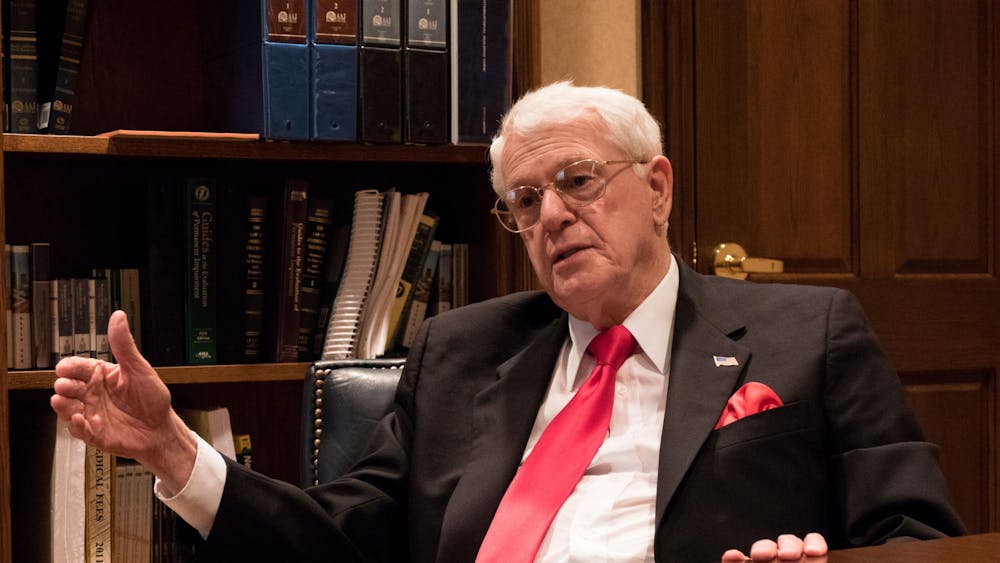Dr. Craig Brater doesn't know if there are any other vice presidents of life sciences around the country. He hasn't even ironed out all the responsibilities of the job. But one thing he does know is that IU's Department of Life Sciences is already strong. He is just looking to making it even stronger.\nOn Dec. 9, 2005, IU President Adam Herbert announced he was creating a new position at IU, vice president of life sciences, in order to strengthen and develop the "highest University priority." He asked Brater, who will continue in his role as dean of the IU School of Medicine, to fill that post.\nBrater will coordinate IU's life sciences strategic plan and will serve as a spokesman to represent IU's interests within the Indiana Statehouse, in Washington, D.C., and the private sector.\n"These are all things I've already been doing in some role, but it just signifies how seriously IU takes the life sciences," Brater said. "I see myself as the designated worrier for the University."\nIn his new role, Brater said there isn't a need to focus IU's life sciences development into one specialized area. He said IU has been great at life sciences for years, so it's just a matter of taking everything a step further.\n"The biggest question is how do you capitalize on the strengths you already have?" he said.\nBrater listed neuroscience, genetics and cancer research as some of IU's many strengths.\nOne area where IU hopes to capitalize is with research in the medical school. Brater said it is his goal "to make IU one of top medical research centers in the nation." \nHe said one obstacle standing in the way is money needed to attract more faculty members.\n"It's ultimately going to get down to how much money we have," he said. "We need to recruit a lot of additional faculty.\n"Look at it this way: If you compare the top 10 or top 15 schools of medicine in the country, places like (University of California, San Francisco) and UC, San Diego -- these real hot beds of life sciences, then you'll find that we have a lot in common," he said. "Our faculty bring in just as many research dollars, but the big difference is that they have twice as many faculty as us."\nBrater said the IU School of Medicine has had a business model for increasing its faculty for years, but plans to wed it to a comprehensive plan which would include IU-Bloomington.\nAnother priority for Brater as a leader of life sciences will be to lobby members of the Indiana General Assembly. He said he is confident of the strides IU has made but wants to market the life sciences more so everyone can be aware of IU's achievements.\nHe said he sees IU's life sciences development plan -- especially when combined with efforts at Purdue -- having a positive impact on both the universities and the state. He noted that Indianapolis is in perfect position to become a leader in life sciences because of support from Eli Lilly and Company, Guidant, Cook Group and others.\n"A lot of cities are trying to develop their life sciences industry, but you'll find that they don't have the type of organizations and infrastructure that we have. It's not even close," he said.\nThis all plays into IU's plan to receive more money from the Indiana General Assembly. Several IU officials, including J. Thomas Forbes, IU's executive director for state relations, said life sciences is a key part of IU's lobbying strategy.\n"Life sciences is important because if we are going to get money from the state, that is where it's going to come from," said IU Chancellor Ken Gros Louis.\nThe strategy attempts to set IU apart from other universities in Indiana, as IU has the only school of medicine in the state, which is also the second largest medical school in the nation. It also helps bring jobs to counteract "brain drain," or the effect of in-state graduates leaving Indiana for other jobs.\n"It's a realization that IU has the only school of medicine in the state, and we are well-positioned to bring teaching, research and jobs to the state," said IU Vice President and Chief Financial Officer Judith Palmer.\nBrater agrees. \n"We are like sort of a triple threat in that respect," he said.\nOverall, IU spokesman Larry MacIntyre said IU is developing its life sciences not only as a way to build its reputation and earn more state funding, but as a part of its responsibility to the state.\n"Since the Daniels administration has arrived, there has been an expectation to expand life sciences and research," he said. "That's the expectation, and we are trying to do what the state expects of us"
Growth in life sciences to remain high priority in Indiana
New vice president ready to strengthen area
Get stories like this in your inbox
Subscribe





